Many liqueur lovers are looking for an answer to the question, Does Campari Go Bad? In the world of spirits and liqueurs, Campari occupies a unique position and is highly sought after as a bold and bitter addition to many classic cocktail recipes.
So, you found Campari in the closet or hangar and you’re wondering, does Campari expire? We will answer all your questions.
If you are an alcohol lover, these articles may be of use to you:
Does tequila go bad, How long does brandy last once opened, Can gin go bad in heat, does vodka go bad, does whiskey go bad, Does Rum Go Bad, Triple Sec Expiration Date, How Long Does Champagne Last, and Does beer go bad in heat?
Can Campari Go Bad?
The answer is, yes, Campari can go bad, but not in the same way that fresh food or produce does. Because Campari is a high-proof alcoholic beverage, it has natural preservative properties that inhibit bacterial growth and prevent it from spoiling quickly.
Campari, being a high-proof alcoholic beverage, is naturally resistant to many forms of spoilage. It possesses an alcohol content of around 24%, which acts as an effective antimicrobial agent. This high alcohol concentration inhibits the growth of harmful bacteria that commonly cause food and beverages to spoil.
As a result, Campari, like other spirits and liqueurs, doesn’t spoil in the conventional sense, as there’s little risk of it becoming a breeding ground for harmful bacteria or molds.
However, this does not make Campari a timeless substance impervious to the effects of aging and environmental conditions. The intricate balance of flavors and aromas that give Campari its distinctive character can degrade over time. This degradation isn’t a matter of safety but rather a decline in the quality of the drinking experience.
The most prominent factor influencing this degradation is oxidation. When Campari is exposed to air—typically after the bottle has been opened—oxygen interacts with the alcohol and other organic compounds within the beverage.
This interaction can trigger chemical changes that gradually alter the color, flavor, and aroma of the Campari. An opened bottle of Campari might start losing its vibrant red hue, becoming more faded or even slightly brownish. The unique bittersweet flavor profile could also shift, perhaps becoming more bitter or less aromatic than a fresh bottle.
Moreover, the storage conditions play a significant role in how quickly these changes occur.
For example, exposure to heat and light can accelerate the degradation process. A bottle of Campari left on a sunny windowsill or near a heat source will likely degrade more quickly than one stored in a cool, dark cabinet.
In conclusion, while Campari doesn’t “go bad” in the traditional sense of becoming unsafe to consume, it can indeed degrade in quality over time. Therefore, proper storage and timely consumption are key to ensuring that your Campari provides the best taste experience.
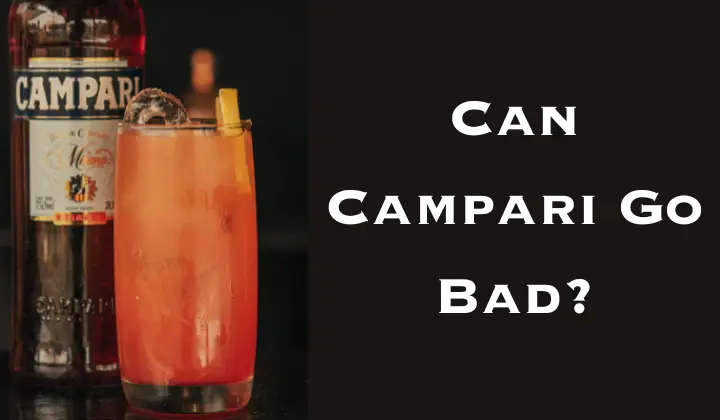
Signs of Bad Campari
A bottle of Campari on your shelf can pose certain questions when it has been there for a while. If you’re concerned about whether your Campari has turned bad, there are several crucial indicators that you can rely on. These signs revolve around the three pillars of any alcoholic beverage’s quality assessment: color, aroma, and taste.
How to Tell If Campari Is Bad?
The first indicator that your Campari might be past its prime is a noticeable change in color.
Campari is famed for its vibrant red hue – a visual characteristic that is as integral to its identity as its unique flavor profile. When fresh and in good condition, Campari presents a captivating, ruby-red color.
Over time, as the Campari begins to degrade, this bright hue may lose its luster. If your Campari has transformed into a dull, faded, or brownish version of its original color, this could be a sign that it has aged considerably or has been stored under less-than-ideal conditions.
Aromas serve as the second checkpoint on your assessment journey. Fresh Campari possesses a complex and tantalizing aroma that is slightly sweet, bitter, and imbued with notes of fruit and herbs.
If you find that the scent drifting from your bottle is off or unpleasant, this could be a warning sign. A degraded aroma might present itself as a muted version of the original, or worse, it could carry an unusual, chemical, or simply ‘off’ scent that is distinctly different from the aroma you’re familiar with.
An altered aroma doesn’t necessarily mean the Campari is unsafe to drink, but it does suggest that the quality has been compromised.
Finally, if your visual and olfactory assessments raise doubts, the taste should be your final verdict. The unique flavor of Campari, straddling the line between sweetness and bitterness, is its calling card.
If this balance is thrown off – if it tastes significantly less sweet, overly bitter, or even sour – then it’s likely that the Campari has degraded in quality. However, a word of caution here – it’s essential never to taste anything if you have strong suspicions that it might be spoiled or if the color and aroma tests have produced worrying results.
In essence, detecting bad Campari is a sensory exercise. By employing your senses of sight, smell, and taste, you can determine whether your Campari still promises a satisfying aperitif or if it’s time to replace the bottle.
However, remember that proper storage and timely consumption can significantly prolong the quality of your Campari, ensuring that each sip delivers the taste experience you desire.
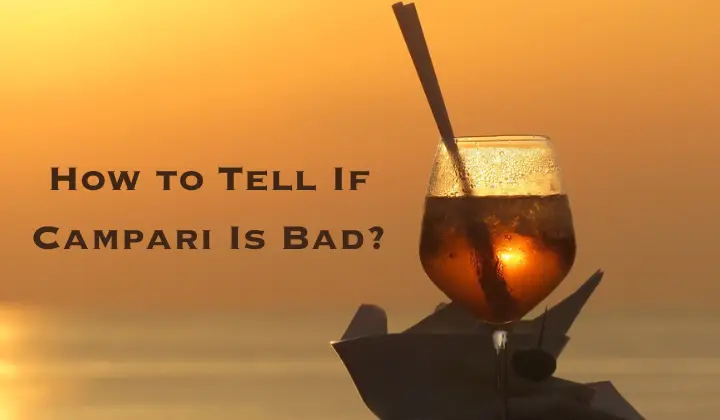
What happens if I drink Campari that goes bad?
Drinking Campari which has “gone bad,” in the sense that its flavor, color, and aroma have degraded due to improper storage or prolonged exposure to air, is unlikely to cause any serious health issues. The high alcohol content of Campari serves as a preservative, reducing the likelihood of harmful bacteria or molds that could cause illness.
That said, drinking degraded Campari may not be a pleasant experience. If the Campari has experienced significant quality degradation, the flavor may be noticeably off, potentially making the beverage less enjoyable or even unpalatable.
However, if your Campari has been contaminated due to improper storage conditions, such as exposure to dirty or unsanitary environments, it could potentially pose a risk.
Similarly, if the bottle seal was compromised and allowed external substances into the bottle, it might not be safe to consume. In these cases, it’s better to err on the side of caution and dispose of the bottle.
In any situation, it’s always a good rule to trust your senses. If the Campari smells or tastes off, it’s best not to drink it. When in doubt, it’s safer to replace the bottle.
Campari Shelf Life
Campari’s shelf life isn’t just a matter of how long you can keep a bottle around before it becomes unsafe to consume. It’s a critical factor in maintaining the beverage’s intricate balance of flavors and aromas, which could be the defining factor in the success of your Negroni or spritz.
So how long does Campari last?
Unopened Campari Shelf Life
An unopened bottle of Campari enjoys a significantly lengthy shelf life, often lasting up to a decade or more. This longevity is mainly due to the alcohol present within the beverage.
With an alcohol content of around 24%, Campari features a natural preservative that shields it from bacterial degradation, allowing it to be safely stored for years.
However, longevity doesn’t equate to immutability. Even within an unopened bottle, subtle changes to the flavor profile may begin to occur over time.
This transformation is generally slow and, to casual drinkers, might not even be noticeable. However, after around the five-year mark, even the unopened Campari might start to lose some of its vibrant flavor characteristics. While it’s still entirely safe to drink, discerning connoisseurs may identify a slight decline from the original flavor profile.
This doesn’t mean you should rush to finish or dispose of your unopened Campari once it hits the five-year mark.
The changes are generally subtle and might not significantly impact your enjoyment of the beverage unless you’re particularly sensitive to these alterations.
Storing Campari Long Term
When it comes to preserving the quality of your Campari over the long term, storage plays a critical role. To keep your Campari at its best for as long as possible, there are a few key storage principles to follow.
Firstly, store your Campari bottle upright. This position is not only convenient for most storage arrangements but also essential in preserving the beverage’s quality. Keeping the bottle upright prevents the alcohol from being in constant contact with the cork (if your bottle uses one).
Continuous contact with the alcohol could cause the cork to degrade over time, potentially leading to tiny cork particles in your Campari or, worse, allowing air to seep into the bottle and hasten the oxidation process.
Secondly, aim for a cool, dark place away from heat and sunlight for your storage location. The optimal temperature for storing spirits like Campari lies between 15 to 20 degrees Celsius (59 to 68 degrees Fahrenheit).
These conditions help preserve the Campari’s color and flavor profile, as excessive heat and sunlight can accelerate the degradation process, leading to faster color fading and flavor changes.
In conclusion, while Campari does have an impressive shelf life, this doesn’t mean it’s impervious to the effects of time and poor storage conditions. By storing your Campari properly, you can significantly extend its life, maintaining the quality and enjoyment of your aperitifs for many years to come.
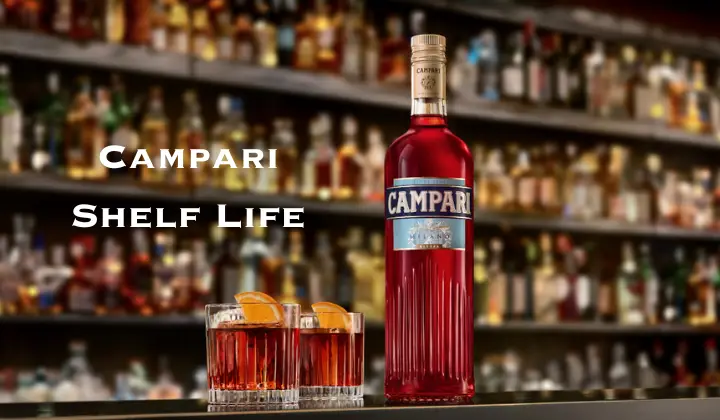
Campari Expiration Date
When examining the label of your Campari bottle, you might wonder about an important detail: the expiration date. So, does Campari have an expiration date like a carton of milk or a bag of chips? Simply put, no, it does not.
Unlike many food and drink products, alcoholic beverages like Campari do not typically come with a printed expiration date. This absence of a definitive ‘use by’ date stems from the preservative qualities of alcohol, which prevent the liqueur from becoming a breeding ground for harmful bacteria or molds that could render it unsafe to consume.
However, it’s essential to remember that the lack of an expiration date doesn’t mean the quality of your Campari remains static indefinitely. Over time, it will likely experience some degradation in terms of flavor, aroma, and color.
Opened Campari Expiration
Once you crack open that Campari bottle, the ticking clock of quality degradation begins. The process of oxidation starts as soon as the bottle is opened and the liquid comes into contact with air. While this does not make the Campari unsafe to drink, it does begin to subtly yet persistently alter its distinctive characteristics.
The vibrant red color might start to fade, the tantalizing aroma could become muted, and the intricate balance of flavors might shift toward a less appealing profile.
Generally, an opened bottle of Campari can maintain its quality for up to a year, assuming it’s stored under appropriate conditions. Consuming your opened Campari within this timeframe will likely allow you to enjoy it at its best.
After this period, while still safe to consume, the Campari may not deliver the taste experience you’d expect from a fresh bottle.
However, remember that this timeframe is not definitive. The rate of quality degradation can vary based on numerous factors, including how much of the bottle remains (more air in the bottle speeds up oxidation) and storage conditions.
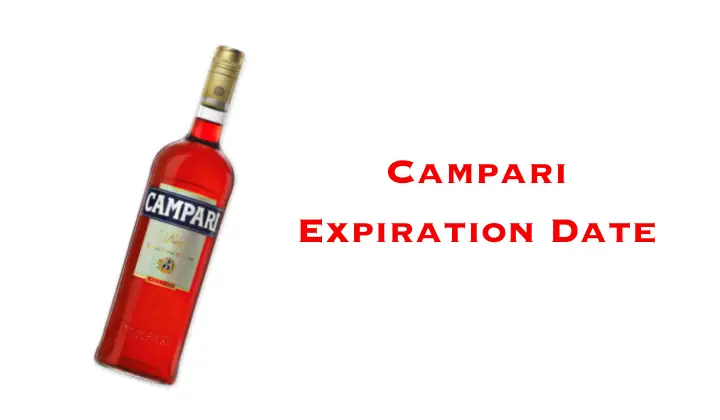
How to Store Campari
Knowing how to store your bottle of Campari correctly is key to preserving its unique characteristics and extending its shelf life. The conditions under which you store this vibrant red liqueur can have a dramatic impact on its color, aroma, and taste, either helping to maintain its prime quality or hastening its degradation.
Here are some guidelines to ensure your Campari storage methods are up to par.
First and foremost, always store your Campari bottle upright. While this might seem like a simple logistical tip, it serves a more crucial role in maintaining the quality of the drink.
If the bottle features a cork stopper, keeping the bottle upright prevents the Campari from continuously contacting the cork. Over time, the alcohol can cause the cork to degrade, which can lead to a variety of problems from cork particles in your beverage to a compromised seal allowing air in, accelerating the oxidation process.
Next, the location of storage is just as important. Campari should be stored in a cool, dark place, away from direct sunlight and heat sources.
A cupboard or cabinet in a part of your home that doesn’t fluctuate drastically in temperature would be ideal.
The optimal storage temperature for spirits like Campari lies between 15 to 20 degrees Celsius (59 to 68 degrees Fahrenheit). These conditions help prevent the accelerated degradation of the Campari’s distinctive color and flavor.
While it might be tempting to store your Campari in the refrigerator to keep it chilled and ready for your next cocktail, it’s generally advised not to do so.
The cold temperature within a refrigerator can affect the taste and viscosity of the Campari, potentially leading to a less enjoyable drinking experience. The fridge’s humidity could also potentially affect the bottle’s seal, allowing air in and promoting faster oxidation.
Lastly, always ensure the bottle cap is tightly sealed after each use. Limiting the amount of air entering the bottle is critical in preserving the Campari’s quality over time.
Every exposure to oxygen kicks off the oxidation process, subtly altering the Campari’s color, smell, and taste.
Tips for Storing Campari
Storing your Campari correctly is crucial to maintaining its quality over time.
While the original bottle is often the best storage container, there are also a variety of other storage solutions you can use to store your Campari and other spirits.
Here are a few suggestions:
Decanters: These are typically made of glass or crystal and come with airtight stoppers. They’re not just functional but also add a touch of elegance to your home bar. However, it’s important to note that decanters should not be used for long-term storage, as they may not be as airtight as the original bottle.
Glass Bottles with Airtight Stoppers: If your original Campari bottle is damaged or lost, you can transfer the contents to another glass bottle with an airtight stopper. Just make sure the bottle is clean and dry before you pour the Campari in.
Stainless Steel Flasks: These are a good option for transporting your Campari, especially when you’re on the go. However, they should not be used for long-term storage as they can alter the taste of the Campari.
Wine Preserver Systems: Some products are designed to remove air from open bottles and then reseal them. These systems can be useful if you have an open bottle of Campari that you want to store for a more extended period.
Silicone Bottle Caps: These are flexible, reusable caps that can fit a variety of bottle sizes. They’re a good option if your original cap or cork is damaged or lost.
Storage Cabinets: While not a container for the Campari itself, a storage cabinet or home bar with a controlled environment can provide cool, dark conditions ideal for storing spirits.
Remember, whatever storage solution you choose, the key principles remain the same: Keep your Campari in a cool, dark place, store it upright, and limit its exposure to air as much as possible.
Does Campari Go Bad FAQ
Let’s try to answer some questions together about does Campari go bad.
Can I drink Campari which is over 10 years old?
Yes, as long as it has been stored properly, it is safe to drink. However, the flavor might have changed slightly over the years.
Can I refrigerate my Campari after opening?
While it won’t harm the Campari, it’s not necessary and may affect its taste and viscosity. Campari is best stored in a cool, dark place.
What happens if I drank bad Campari?
If you accidentally consume spoiled Campari, you might experience symptoms like nausea, vomiting, or diarrhea. If you suspect you’ve ingested bad Campari and are feeling ill, seek medical attention.
Can Campari go bad?
Yes, Campari can go bad, but not in the same way as perishable food items. It has a long shelf life due to its high alcohol content, which acts as a natural preservative. However, if improperly stored or left open for a long time, its color, flavor, and aroma may change.
How can I tell if my Campari has gone bad?
Indicators of spoiled Campari include changes in color, aroma, and flavor. Fresh Campari should have a vibrant red color, a slightly sweet and fruity smell, and a distinct bitter-sweet taste. If it has a dull color, off smell, or altered taste, it might be past its prime.
Does Campari have an expiration date?
No, Campari does not come with a printed expiration date. However, once opened, the quality will start to decline after about a year due to oxidation.
How long does an unopened bottle of Campari last?
An unopened bottle of Campari can last for years, even up to a decade or more, if stored correctly. However, the flavor may subtly change over time, especially after the five-year mark.
Can I store opened Campari in the refrigerator?
While it won’t harm the Campari, it’s generally not recommended. The cold temperature can affect the taste and viscosity of the drink.
What are the ideal storage conditions for Campari?
Campari should be stored upright in a cool, dark place away from heat and sunlight. The optimal temperature for storing spirits like Campari is around 15 to 20 degrees Celsius (59 to 68 degrees Fahrenheit).
Why should I store Campari upright?
Storing Campari upright, especially if it has a cork, prevents the alcohol from coming into constant contact with the cork. This contact could cause the cork to degrade, affecting the taste of the drink and potentially compromising the seal of the bottle.
Can I use a decanter to store Campari?
While decanters can be used for short-term storage and serving, they may not provide an airtight seal comparable to the original bottle, making them unsuitable for long-term storage.
If my Campari has changed color, is it safe to drink?
A color change in Campari typically indicates that some flavor and aroma degradation has occurred, but it doesn’t necessarily mean the drink is unsafe. Always trust your senses; if it smells and tastes fine, it’s likely safe to consume.
Is it safe to drink Campari that’s been open for over a year?
Yes, it is generally safe to drink Campari that’s been open for over a year. However, the quality in terms of flavor and aroma may have diminished due to oxidation. It’s recommended to consume opened Campari within a year for the best experience.
You can also check out these articles:

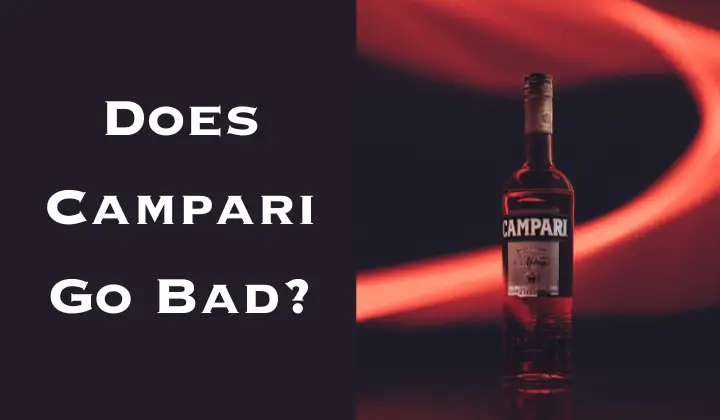
Someone essentially assist to make seriously articles I would state. That is the first time I frequented your web page and so far? I amazed with the research you made to create this particular post amazing. Wonderful activity!
Hi there, You have performed an excellent job. I will certainly digg it and personally suggest to my friends. I’m confident they will be benefited from this web site.
Hi there! I know this is kinda off topic but I’d figured I’d ask. Would you be interested in exchanging links or maybe guest authoring a blog post or vice-versa? My blog addresses a lot of the same subjects as yours and I think we could greatly benefit from each other. If you might be interested feel free to shoot me an e-mail. I look forward to hearing from you! Excellent blog by the way!
Together with everything which seems to be building throughout this specific area, your viewpoints are actually quite radical. Nevertheless, I beg your pardon, because I can not subscribe to your whole plan, all be it exhilarating none the less. It looks to everybody that your opinions are actually not totally validated and in fact you are yourself not wholly certain of the point. In any case I did enjoy reading it.